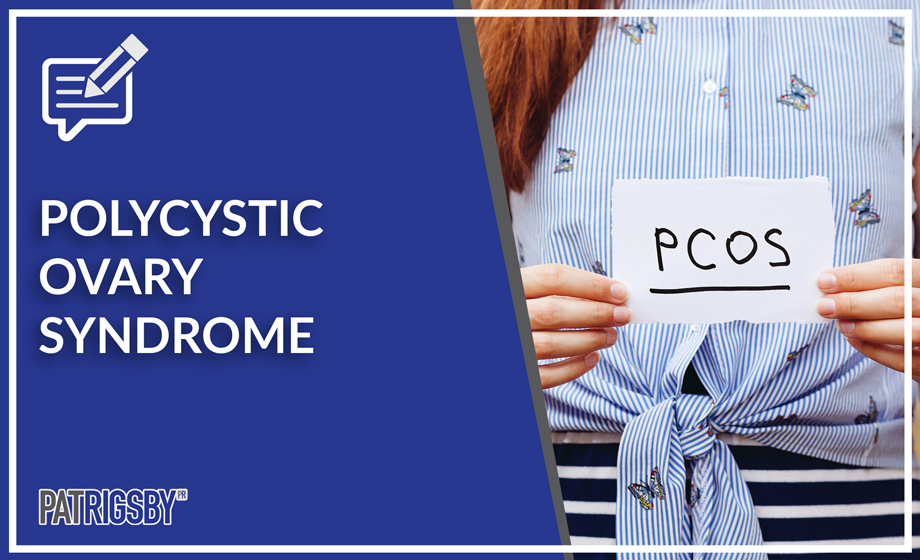By: Igor Klibanov, B.A. (Spec. Hons.), CTT, RTP
It’s very common, but it’s rarely talked about: PCOS. Polycystic Ovary Syndrome. It’s a condition women get when they have high testosterone, high insulin, high cortisol, and other hormonal imbalances. Why doesn’t it get talked about much? Because it’s embarrassing.
The signs and symptoms that these hormonal imbalances produce are:
- Looking like you’re pregnant when you aren’t. This is an unusual fat storage pattern for pre-menopausal females.
- Male-pattern hair growth/loss. So women might start losing hair on their head, and growing hair on their forearms and back.
- Skin problems, like acne, or oily skin
…and others.
So if you are a fitness professional who works with pre-menopausal women (that is, below age 52 or so), chances are you have quite a few clients who are PCOS, but they may not have told you. Or, they may have, and you weren’t sure what to do with that information. If that’s you, this article will be particularly helpful.
Having gotten my fair share of clients with PCOS, I decided to read the book Metabolic Aspects of PCOS. It’s a dense, academic book, not mainstream, intended for a clinical audience (people who treat PCOS). So yeah, it’s complicated, but in this article, I’ll give you some of the notes that I took from that book.
Ready? Here are some bullet points about PCOS:
- To be diagnosed with PCOS, a woman must meet 2 of these 3 criteria:
- Irregular periods, or periods that are more than 35 days apart. The medical term for this is “oligomenorrhea.”
- Either elevated androgens (that’s hormones like testosterone, DHEA, and androstenedione), or symptoms of high androgens
- Ultrasound evidence of ovaries with cysts on them
- The “hormonal signature” of PCOS is:
- High luteinizing hormone (LH). LH is a “brain hormone” that tells the ovaries to make estrogen. When estrogen is low, LH is high, and vice versa. So low estrogen should trigger the release of LH, and in turn, LH should trigger a release of more estrogen. This cycle is “broken” in women with PCOS.
- Decreased SHBG (sex hormone binding gobulin). In the blood, estrogen, testosterone and progesterone don’t “float around” by themselves. They need a “carrier” to take them around. That “carrier” is a protein called SHBG. It’s like a person in a taxi. The person is the hormone, and the taxi is SHBG. As a result of lower SHBG, it makes testosterone higher in women, because more of the testosterone is “free.”
- Low progesterone. The hormone that is dominant in the second part of the menstrual cycle.
- High cortisol. The stress hormone.
- One study found that there is more subclinical hypothyroidism in women with PCOS compared to women with the same weight, but without PCOS.
- Another study found that the fat cells of women with PCOS are 25% larger of women without PCOS, but of the same weight.
- According to one study, obese women with PCOS are 400%-2900% more likely to have sleep apnea compared to women of the same weight and body fat percentage, but without PCOS.
- This does not apply to lean women with PCOS.
- Women with PCOS have a higher risk of heart disease, compared with women without PCOS, according to several studies (like this one, this one and this one).
- More women with PCOS have depression, compared to women without PCOS, mostly due to the infertility (according to this study).
- 34-57% of women with PCOS have anxiety (reference here).
- Treatment:
- The first order of business is the most obvious: diet and exercise.
- One study analyzed different diets, and found that one that has 50% low-glycemic carbohydrates, 30% fat, and 20% protein seems to have the best effects on PCOS.
- As far as drugs are concerned, the most frequently prescribed drugs for PCOS are metformin and thiazolidinediones. These are basically drugs usually given to diabetics, but since blood sugar and insulin dysregulation is at the heart of PCOS, it’s appropriate here as well.
- As far as natural supplements are concerned, one of the most proven is myo-inositol, as well as glucomannan.
So now you just saw the “clinical” side of PCOS, but how does it affect them in “real life”? What we hear from our clients who have PCOS is that they:
- Don’t feel like going out, because they think they don’t look good. They don’t look feminine.
- Feel like prisoners within their own body
- Have poor body images.
And we, as fitness professionals can have a significant impact on their quality of life. Provide good service that others don’t provide, and they start “whispering” to their PCOS friends about how good you are.
P.S. – 6-Weeks of Coaching…Free.
Get a surge of new clients and revenue over the next 6 Weeks with ZERO FEE and no obligation to continue?
If you’re a current business owner who wants to add 50K or more in annual revenue over the next 12 month, you can Test Drive our coaching program for 6 Weeks with no fee or even an obligation to continue as a way to demonstrate how we can help you grow your business.
No strings attached. No obligation. You get our best coaching & tools…and hopefully, you’ll love it enough that you want to keep working together.
Would you be interested in discussing?
If so, email me here with ‘interested’ in subject line and we’ll set up a chat.










